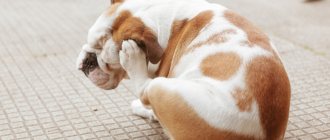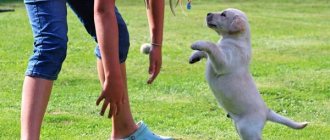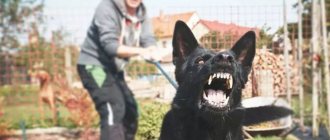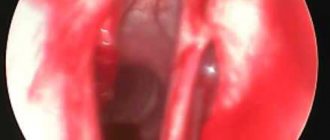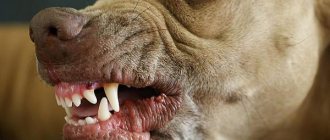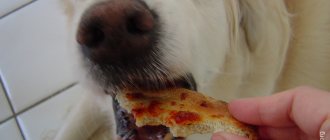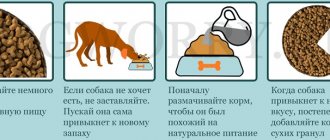The dog has no appetite: a natural condition or a sign of disease
If the dog has lost its appetite, but there are no external signs of illness, then it was caused by other reasons. The following can lead to reluctance to eat:
- The weather is too hot. The dog may lose the desire to eat when the air temperature rises above thirty degrees Celsius. This is why many animals eat much less in the summer.
- Regular use of vitamin complexes. They contain a huge amount of micronutrients, and therefore the pet does not eat so often.
- The beginning of sexual hunting. Loss of appetite in animals is often associated with increased hormonal processes. For example, during the heat period, most dogs are more concerned about meeting their needs rather than eating.
- Eruption of new teeth. Puppies begin teething at an early age. Quite often this process is accompanied by nausea and a general deterioration in well-being. This leads to the dogs refusing to eat.
- Breed predisposition. Some terriers and large breeds deliberately practice fasting. Such dogs may refuse food for several days to improve their health.
Additional Information! All of the above reasons do not require outside intervention. The dog will regain its good appetite on its own.
Decreased appetite is normal
There are cases when a decrease in appetite in an animal may be normal and there should be no reason for alarm. This:
- The dog is in heat, has lost its appetite and the dog may even look exhausted. This often occurs, since the animal’s hormonal levels change during this period, so there is no need to panic. Usually, appetite subsequently returns to normal. This does not occur in all dogs, so you should not expect such a reaction from every animal. Some “ladies,” on the contrary, may suffer from increased appetite. Loss of appetite can also occur in the second half of pregnancy and immediately after childbirth.
- The weather is too hot. This is normal if it’s +30 outside for a long time, and the dog has lost his appetite. What to do? Give more water and wait until it gets a little cooler. Most likely, in hot weather, your desire to eat decreases.
- Excess food. As strange as it may sound, some owners literally overfeed their pets. Nowadays it is very common to find animals that are overweight and even obese. But there are some dogs that are much smarter than their owners - when they feel that their body already has an excess of nutrients, they independently arrange “fasting days” for themselves. In such cases, you should not try to force feed them.
- It is also normal to refuse food when an animal is undergoing treatment with any potent drugs. But this is only the case when the animal is recovering. If the dog’s condition worsens, then it is necessary to resort to force-feeding the animal, possibly even with the help of droppers.
- Another reason for decreased appetite in dogs is age. In old age, a dog consumes much less food, which is associated with a decrease in its activity. And anticipating its imminent death, the animal may refuse food altogether.
- The cause of decreased appetite in puppies may be teething. A dog child also endures this process quite hard, just like a human child. The puppy will chew everything that gets in its way, but during these days it will refuse food. The best option would be to give him some kind of nutritious bone - now in pet stores you can find a lot of options for just such cases.
- Oddly enough, another norm can be considered... a bad mood. Yes, a dog, just like a person, may simply not be in the mood - he will refuse to eat and will “lie and sigh in the corner.” But in a healthy dog this should go away quickly, so if you see that this period is prolonged in your pet, then the reason is not the usual blues, but much deeper and needs to be looked for. Perhaps with the help of a specialist.
What to do if your pet has no appetite for a long time
Ear diseases in dogs can lead to refusal to eat.
If the dog is lethargic and does not eat for 3-5 days, this may indicate the development of an illness. To make the diagnosis easier in the future, you need to do the following:
- Carefully check dry food and other dog food. It is necessary to exclude from the diet all foods that can lead to problems with the functioning of the gastrointestinal tract.
- Observe your pet's behavior at home. Weakness and apathy can be a symptom of the development of diseases.
- Conduct an examination of the oral cavity. It is necessary to carefully examine the teeth and gums to ensure that there are no inflammatory processes.
- Inspect the ears. Particular attention should be paid to the ears, as some diseases of the auditory organs can cause pain while chewing food.
- To measure the temperature. Some diseases are accompanied by elevated body temperature.
Important! Even if there are no visible signs of disease development, you need to call a veterinarian for a consultation.
Reasons for hunger strike
If the question arises why the dog does not eat, it is worth understanding the problems that may be hidden behind a simple refusal to eat. The most common psychological factors:
- Resentment. If you had to leave the animal alone for some time, which is unusual for the usual daily routine, then it may well be sad and because of this refuse food after the owners return.
- Stress. If there was a need to transport the animal to another habitat, or simply spend a long time in transport, a temporary loss of appetite may occur due to fatigue and nerves.
- Loud noise. If there is a sharp and bright noise, the dog may become very frightened and completely refuse all the treats offered. It is worth quickly taking her away from the place that causes horror and calming her down.
- When there is a female dog in heat near a male dog, the possible outcome for several days is that the dog does not eat anything. At such a moment, the basic instinct awakens, which overshadows the basic needs of the body. This problem should go away on its own within a few days.
These reasons are easy enough to remove and make the dog enjoy life. It is worth spending more time with her, constantly playing and showing love. When the animal feels safe and is sure that nothing terrible is in store for it, it will be able to calm down and return to its usual daily routine and dietary standards. If she begins to refuse food, but this is not associated with any stressful situations, then the dog may have health problems. The main variants of diseases are:
- Stomach problems. If your dog is not eating anything, this may indicate that he may have an upset stomach.
- Sick teeth. When an animal begins to eat, but quickly spits out food, problems with the jaw or a separate canine are possible.
- Worms. They interfere with healthy digestion of food, causing the dog to not eat or drink anything, which causes him even more discomfort.
- Difficulties in the functioning of the heart. Due to general malaise, the animal loses its appetite.
It is definitely worth monitoring the dog’s condition; if suddenly other additional factors and symptoms are added to the refusal to eat, you should contact a veterinarian as soon as possible.
When to start getting nervous
A decrease in activity may indicate that the appetite has disappeared due to health problems.
If your pet dog does not eat for several days, but at the same time feels well and remains in a normal mood, there is no need to worry. However, if your dog has lost his appetite and is exhibiting other symptoms, he will need help from a veterinarian.
Symptoms to watch out for include the following:
- fever;
- shiver;
- vomit;
- mucus in stool;
- refusal to drink water;
- decreased activity;
- increased anxiety;
- lethargy.
Additional Information! When loss of appetite is accompanied by vomiting of bile, there is no need to panic. This happens due to prolonged fasting.
Physiological reasons
If you notice that your dog has lost his appetite, is lethargic or, conversely, irritable, or has some other behavioral changes, then the problems may be much deeper. Health problems that may cause the problem under study:
- The dog has an oral injury, indigestion, or some kind of dental problem. Examine the dog’s oral cavity yourself and observe the animal’s stool. Try giving your dog softened, ground food. And it is better, of course, to consult a specialist.
- Poisoning. Another common reason why a dog loses its appetite. If you suspect poisoning, you should definitely go to the clinic, as delay can be deadly, especially if you don’t know what exactly your animal ate.
- Also, the cause of loss of appetite may be the presence of intestinal parasites in your pet. Regularly give the animal anthelmintic medications. A doctor can make an accurate diagnosis, unless, of course, the animal already has an advanced form.
- The most dangerous causes are problems with any internal organs: thyroid, heart, lungs, liver, etc.
You may not notice the very beginning of the disease, and the animal cannot tell you about it - it can only show that it feels bad by refusing to eat. That is why, as soon as you see that your dog has lost his appetite, a doctor should look for the reasons. Especially in cases where there seem to be no prerequisites for this.
Behavioral and physiological factors influencing food intake
Depression often leads to a decrease in appetite.
Factors that can cause a dog to refuse to eat include the following:
- Depression or frequent occurrence of stressful situations. Animals that are depressed often refuse to eat or drink.
- Poor quality products. Some people decide to save money on pet food and buy cheap food for them. Sometimes this leads to poisoning, abdominal pain and further loss of appetite.
- Using the same food. If you don't give your dog a varied diet and constantly give him the same food, he may stop eating.
- Parasites. The dog may lose its appetite due to worms. To avoid them, you need to regularly check your pets for parasites.
- Consequences after taking medications. Some medications cause the dog to stop eating.
What can veterinarians offer?
Often people are unable to independently determine why their dog has lost its appetite. In such cases, you will have to seek help from a veterinarian. A specialist will help not only to understand the causes of the problem, but also to return the former desire to eat food.
To determine the main causes of lack of appetite, the doctor will conduct the following examinations:
- general analysis of urine and blood;
- determination of the amount of hormones in the blood;
- X-ray examination to exclude tumors and the need for surgery to remove them;
- Ultrasound of the abdominal cavity;
- examination of the anus and intestines to detect worms.
Important! Depending on the diagnosis, the doctor must prescribe effective treatment.
How to restore a dog's appetite if it is healthy
Active rest helps improve appetite.
There are often cases when a dog is completely healthy, but practically does not eat. There are several effective ways to help normalize nutrition in male and female dogs:
- Feed your pet at the same time every day.
- If the dog has not finished eating, the bowl should be removed from under its paws and hidden until the next meal.
- Do not allow your dog to snack between meals so that it does not spoil his appetite.
- Do not overfeed your pet. You need to apply exactly as much as he can eat at one time.
- Spend a lot of time with your dog in the fresh air so that he moves more and does not sit at home.
Additional Information! To make your dog want to eat more often, you need to buy his favorite food. This can increase your pet's appetite so much that it starts drooling.
How to increase your pet's appetite?
If the dog refuses food not because of illness, then the owner asks the question: how to increase this very appetite?
The best option is to simply walk more often. When the animal runs up, it will begin to look for sources of energy replenishment.
It is also worth adjusting your diet. You should feed twice a day, and give as much as the dog can eat without overeating. There should always be clean water in the feeder. As a conclusion, I would like to say that if you suspect any disease in your pet, then call a veterinarian at home !
Danger to humans
Most often, a dog’s lack of appetite does not pose any danger to humans. However, there are cases when the reason for refusing food and water is rabies. In order to promptly determine that your pet has developed this disease, you need to become familiar with its main symptoms. Signs of rabies include the following:
- Cold look. Animals with rabies most often have a blank and cold look.
- Irritability. Dogs become more irritable and begin to bark more often.
- Diarrhea. One of the signs of rabies is indigestion accompanied by diarrhea.
- Weight reduction. Because rabies can cause dogs to completely lose their appetite, they quickly lose weight.
Additional reasons why your dog won't eat
In addition to the mentioned reasons for loss of appetite in dogs
, there are some more that can provoke a refusal to eat:
- Stress,
- Hot weather,
- Pain syndrome (for example, caused by injury),
- Viral infections
- Pancreatitis,
- Stomach bloating
- Peptic ulcer,
- Chemotherapy or radiation therapy.
Preventive measures
The veterinarian will help determine the reason for refusal to eat.
Every dog owner should do everything to ensure that his pet always has a good appetite. To do this, the dog must be fed regularly, without taking long breaks between meals. It is better to develop a schedule for eating food so that the dog does it at the same time.
You need to feed your dog warm and tasty food. If a dog turns up its nose and stops eating, it means it doesn’t like the food. In this case, you will have to slightly change the daily diet and add more of your dog’s favorite foods. The diet should consist of:
- lean raw meat;
- buckwheat or rice porridge;
- raw or boiled vegetables.
When to contact a veterinarian
Many people do not know when to seek help from a veterinarian if their dog’s appetite disappears.
If your dog has lost its appetite, it is not necessary to visit a doctor immediately. Perhaps this is a temporary phenomenon that is not associated with disease. However, if the dog’s health worsens and his stomach begins to grumble, then you need to consult a specialist. At the same time, time can be running out and therefore there is not a minute to waste. You need to immediately take your pet to an experienced veterinarian so that he can figure out why the dog has no appetite and what needs to be done to get it back.
Lack of appetite in a dog is a common phenomenon that almost every dog owner has encountered. Before solving this problem, you need to familiarize yourself with the main reasons for your dog’s refusal to eat.


